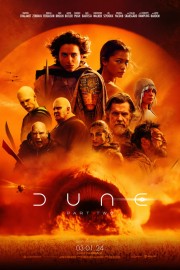Dune: Part Two
Rewatching “Dune: Part One” again a few weeks ago, not much had changed in my opinion of the first film in Denis Villeneuve’s adaptation of Frank Herbert’s 1965 sci-fi classic novel- remarkable technical accomplishments but a muted emotional pallet. A big part of that is because, while he found a natural ending spot in which to split up the story, an emotional climax was beyond the film’s gaze, out in the distance, where it wasn’t able to be felt until we arrive at the point “Part Two” leaves us. By the point we’re ready to see what happens next, the full story has been told, and it has left us emotionally wrung out.
I’m fascinated by the way science fiction films explore the concepts of prophecy and faith and zealotry. One of the things that I found so rich about “Part Two” is how we see multiple factions, and how they react to the possibility that Paul Atreides (Timothée Chalamet), whom is hiding with the Fremen of Arrakis after the Harkonnens have attacked their rule of the spice planet, and murdered his father, Duke Leto Atreides (Oscar Issac). Paul and his mother, Lady Jessica (Rebecca Ferguson) managed to escape, and are now among the nomad tribes of the planet. Throughout the first film- and now this one- we get glimpses that imply more about Paul’s destiny than he realizes; in “Part Two,” through the actions of his mother and one of the leaders of the Fremen, Stilgar (Javier Bardem), we begin to see him- and others- realize it, and what they feel concerns them.
This is a rare “Part Two” that truly elevates what came before it. Now that we are becoming more familiar with the larger political landscape of Herbert’s world, we understand not just the forces against the Atreides family, but the ways in which Paul’s visions play into the battle that will unfold on Arrakis. We begin to see what threats the world of Arrakis holds in a more profound manner, and the rituals that Paul will have to go through in order to arise as the leader he is supposed to be. And Chani, Zendaya’s character, is a flesh-and-blood character whom will become equal part romantic interest for Paul, but also one of the people most terrified by what he could mean for her home. The Fremen have several different factions- some of whom believe Paul is the messiah that will lead them to a prosperous land- while others laugh that off. When Paul feels the need to lean in to his messianic prophecy, it creates ripples that will bring all attention to Arrakis, including those of the other Great Houses, and the Emperor (Christopher Walken), who might have a larger part to play in the battle between houses Atreides and Harkonnen than we think.
Villeneuve might be one of the best purveyors of science fiction we’ve got working now. Between “Arrival,” “Blade Runner 2049” and now “Dune,” he is intrigued by philosophical stories that capture emotional emptiness, and challenges the audience to go with it. He also knows how to create a vast world, and populate it with people who make sense in it. The world of “Dune” in Villeneuve’s hands is broad and believable, even when- in this film- we are taken to the planet where Feyd-Rautha (Austin Butler), one of Baron Harkonnen’s nephews, is having his birthday celebration- an opportunity to wipe out more members of the Atreides family- and it is shot in infrared black-and-white, in a way that reminds us of the visionary worlds of “Metropolis” or the Strangers’s subterranean lair in “Dark City.” I cannot say there is nothing we have not seen in “Dune” before, but the ways in which Villeneuve and cinematographer Greig Fraser bring the world created by this film’s production designers, costume designers and visual effects team to life is remarkable. And as much as I had muted feelings about Hans Zimmer’s Oscar-winning score for “Part One,” in “Part Two,” he transforms it into its own soundscape, introducing new themes, musical ideas and collectively expanding the film’s sound in a way that doesn’t just feel like a rehash of his earlier work (which I felt “Part One” was) and its use of ethnic themes and instruments.
There is quite a bit to discuss about this film, from the performances to the look and feel of the film to the themes and ideas, but I will leave my thoughts on “Dune: Part Two” at this- “Dune Messiah” will probably be the most remarkable trilogy capper in over 20 years. I cannot wait to see how Villeneuve sticks the landing.










